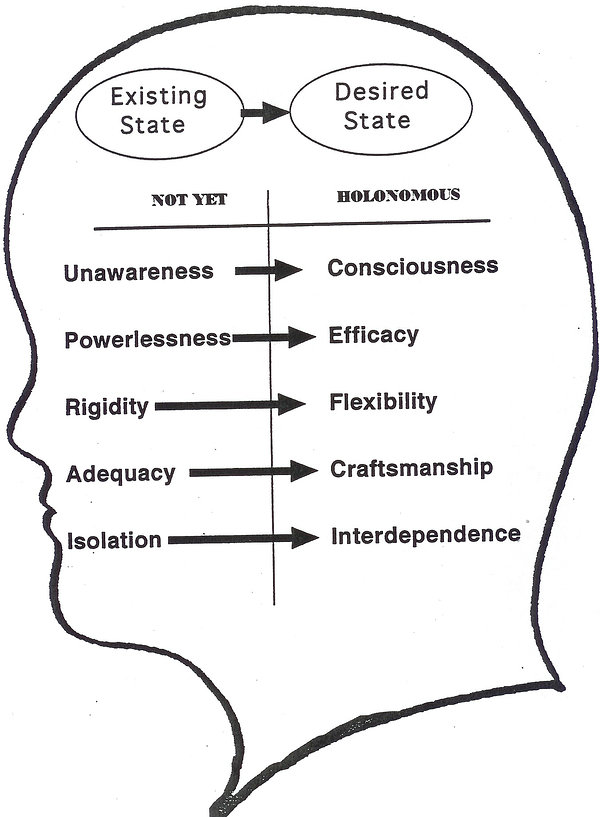
| j | f | m | a | m | j | j | a | s | o | n | d |
| 1 | 6 | 10 | 14 | 19 | 23 | 27 | 32 | 36 | 41 | 45 | 49 |
| 2 | 7 | 11 | 15 | 20 | 24 | 28 | 33 | 37 | 42 | 46 | 50 |
| 3 | 8 | 12 | 16 | 21 | 25 | 29 | 34 | 38 | 43 | 47 | 51 |
| 4 | 9 | 13 | 17 | 22 | 26 | 30 | 35 | 39 | 44 | 48 | 52 |
| 5 | 18 | 31 | 40 |

Holonomy: Paradox and Promise
As we develop soul in our work we need to recognize our dual identity: we are both individuals and members of a group. Indeed, finding the soul of work involves the balance and integration of apparent opposites, such as head and heart, intellect and intuition, and self and group. This process is not so much based on the shoulds but upon what is. It is my belief that as we attend to the soul of work we will find we feel more complete.
- Paulson, 1995
Current organizational theory posits that there are strong parallels between natural systems and social systems. This connection suggests that organizations have much to learn from such disciplines as evolutionary biology and quantum physics which employ systems theory. One tenet of systems thinking, both for natural systems and for organizations, is the propensity of the individual elements in the system to maintain their integrity, while also influencing and being influenced by the larger system. This part/whole dichotomy has been described by Arthur Koestler (1972) as holonomy. Holonomy combines the Creek roots: holes meaning whole, and on meaning part. Holonomy conveys the notion that an entity is both an autonomous unit and a member of a larger whole simultaneously. This concept implies acombination of opposites being both a part and a whole; functioning autonomously while working interdependently. A holonomous system captures the promise of stability, growth and learning. However, because all life forces are simultaneously independent and interdependent, self-assertive and integrative, whole unto themselves yet always a part of systems larger than themselves—holonomy also presents a paradox.
This article presents holonomy, the paradox and the promise, as the fountainhead of continuous human growth and intellectual development. Its purpose is to identify and describe both the dynamictensions inherent in the paradox, as well as the systemic resources necessary for its resolution.
Levels of Autonomy Within the System
We will present educational practice as a system where in multiple levels of an organization can mediate and be mediated towards their continual becoming as holonomous entities.
The Autonomous IndividualLike holonomy, autonomy also comes from the Greek: auto, meaning self and meaning to hold sway. Autonomous individuals set personal goals and are self-directing, self-monitoring, self-analyzing, self-evaluating and self- modifying. They are in a constant state of experiencing and experimenting, learning from each new situation. Autonomous human beings are self-referencing, drawing on their own unique systems, experiences, strengths and origins towards continuous growth. This growth includes the capacity to transcend original patterns.
In autonomous, assertive individuals, growth emanates from within, as a tree does from a seed.
The evolution of this chapter is a result of deliberation over time by the authors and the Go-director, Bob Garmston, and Senior Associates of the Institute for Intelligent Behavior: Bin Baker, John Dyer, Peg Luidens, Marilyn Tabor, Bruce Wellman and Diane Zimmerman. For their insights and assistance we are deeply appreciative.
Arthur L. Costa, Ed. D., Kalaheo, Hawaii and Laura Lipton, Ed. D., Yorktown, New York
Copyright © 2001 Arthur L. Costa. All rights reserved.
Guldane | 04 februari 2006Als ik het zo lees, dan denk ik dat ik het weet, maar ik mag het niet zeggen he? |